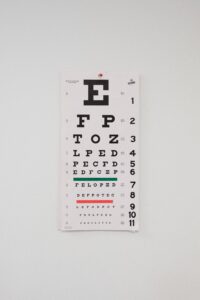 According to WebMD, the eyes are the most highly developed sensory organs in your body. Did you know that more of your brain is dedicated to the sense of sight than to all of the other senses combined? So, it makes sense that you would do all that you can to protect and care for these important organs. Vision insurance can be a great asset as you work keep your eyes healthy.
According to WebMD, the eyes are the most highly developed sensory organs in your body. Did you know that more of your brain is dedicated to the sense of sight than to all of the other senses combined? So, it makes sense that you would do all that you can to protect and care for these important organs. Vision insurance can be a great asset as you work keep your eyes healthy.
What is vision insurance?
In a nutshell, vision insurance functions like a discount. It is an ancillary benefit used to reduce the costs of eye-related care, eye products, and eye surgeries. Group vision plans are typically purchased through employers, associations, or government programs like Medicare or Medicaid. Plan subscribers usually receive free eye care, like annual eye exams, and a fixed discount on eye wear in exchange for a monthly premium. Typically, vision insurance is a separate policy from your health insurance.
What are the benefits of having vision coverage?
Because your eyes are the most complex sensory organ in your body, it is important to keep them healthy. Vision coverage allows you to have annual eye exams. At these exams, the optometrist determines if you need corrective contact lenses or glasses to improve your eyesight. Vision plans vary but typically you can get a new pair of glasses or contact lenses every 12 months.
Eyes aren’t just the window to your soul – they also offer a glimpse into your health. A little known fact is that during a comprehensive eye exam, your doctor is able to evaluate the health of the blood vessels in your retina. This is a good indicator of the health of your blood vessels in the rest of your body. These exams can even detect hidden medical conditions like brain tumors, diabetes, high cholesterol, high blood pressure, or even cancer.
What does vision insurance cover?
When it comes to the cost of your glasses, you need to understand that there is a difference between lenses and frames. Usually, standard lenses are covered 100% but if you want any added features like reflective coatings, anti-scratch resistance, or anti-glare coatings, you would be responsible for the additional cost. For frames, your insurance provider will give you an allowance. Let’s say that they will give you a $130 allowance. If you pick a pair of frames that costs $200, you are responsible for the difference. Contact lenses are also covered but usually in lieu of frames. In other words, you need to pick one or the other.
Very few vision plans cover elective surgeries such as Lasik surgery or Photorefractive Keratectomy (PRK), but oftentimes your insurance provider may provide you a discount for those services. Also, if you take part in a Flexible Spending Account (FSA) or Health Savings Account (HSA), you can use those funds to cover expenses not covered by your vision plan.
As with other types of health insurance, vision insurance works with a network of doctors to provide discounted prices. So, you want to make sure that your eye care practitioner is in your network to get the most savings. Typically, out-of-network benefits aren’t very good.
Vision insurance plays a huge part in keeping your eyes healthy. Through regular eye exams, not only are your eyes evaluated, but the health of the rest of your body is too. By scheduling eye exams, you are also able to obtain corrective eye wear that allow you to see clearer and without eye strain. Healthy vision is a benefit you don’t want to lose!




